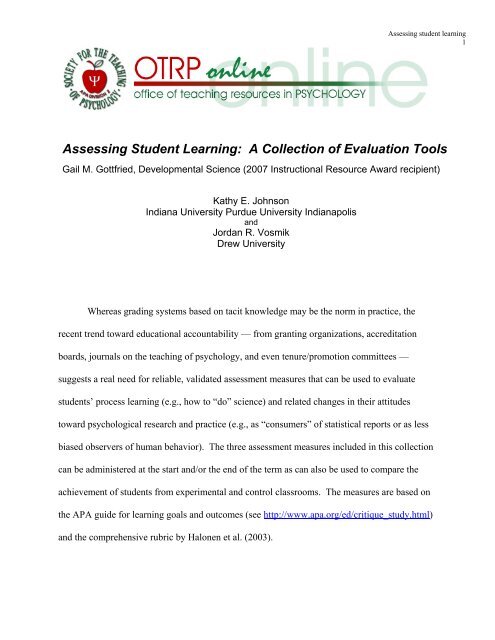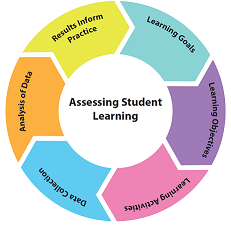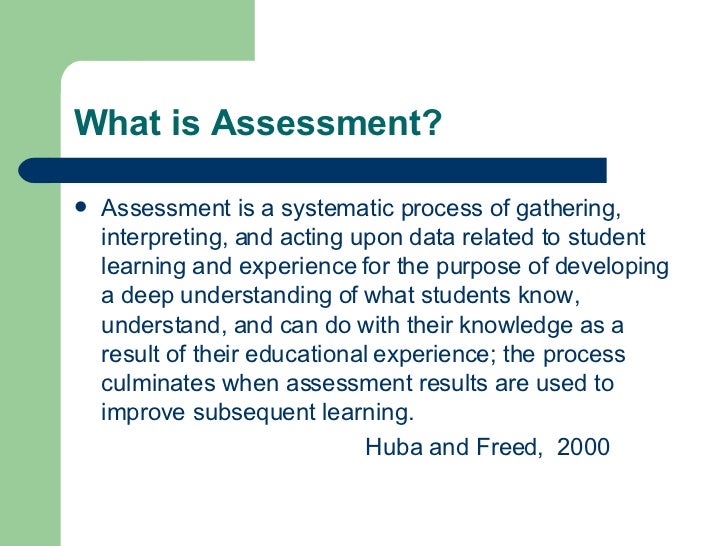Assessment is an integral part of instruction, as it determines whether or not the goals of education are being met. Assessment affects decisions about grades, placement, advancement, instructional needs, curriculum, and, in some cases, funding. Assessment inspire us to ask these hard questions: 'Are we teaching what we think we are teaching?' 'Are students learning what they are supposed to be learning?' 'Is there a way to teach the subject better, thereby promoting better learning?'
- How Teachers Assess Student Learning
- Assessment Of Student Learning Meaning
- Assessment Of Student Learning
Today's students need to know not only the basic reading and arithmetic skills, but also skills that will allow them to face a world that is continually changing. They must be able to think critically, to analyze, and to make inferences. Changes in the skills base and knowledge our students need require new learning goals; these new learning goals change the relationship between assessment and instruction. Teachers need to take an active role in making decisions about the purpose of assessment and the content that is being assessed.
Assessment influences what a student interprets to be the important learning goals for a course. The assignments we design constitute the means by which we assess student learning. In the best case scenario, assessments should be aligned with course goals and objectives. Assessment of Student Learning Outcomes Teaching requires assessment, i.e., the evaluation of student understanding in light of the goals of a lesson or a course. This is a broad definition, and indeed, there. Assessment should occur throughout students’ careers, from the first year experiences of new undergraduates through the final stages of the professional or graduate student career.
Grant Wiggins, a nationally recognized assessment expert, shared his thoughts on performance assessments, standardized tests, and more in an Edutopia.org interview. Read his answers to the following questions from the interview and reflect on his ideas:
Do you agree with his statements? Why or why not? Discuss your opinions with your peers.
When assessment works best, it does the following:
Provides diagnostic feedback- What is the student's knowledge base?
- What is the student's performance base?
- What are the student's needs?
- What has to be taught?

How Teachers Assess Student Learning
 Helps educators set standards
Helps educators set standards- What performance demonstrates understanding?
- What performance demonstrates knowledge?
- What performance demonstrates mastery?
- How is the student doing?
- What teaching methods or approaches are most effective?
- What changes or modifications to a lesson are needed to help the student?
- What has the student learned?
- Can the student talk about the new knowledge?
- Can the student demonstrate and use the new skills in other projects?
For student self-evaluation:
- Now that I'm in charge of my learning, how am I doing?
- Now that I know how I'm doing, how can I do better?
- What else would I like to learn?
- What is working for the students?
- What can I do to help the students more?
- In what direction should we go next?
Continue to the next section of the guide, Types of Assessment.
This guide is organized into six sections:
- Why Is Assessment Important?
Assessing Student Learning
We work with instructors to design custom learning assessments that help them gain feedback about what their students are learning. These learning assessments include informal, non–graded strategies such as Classroom Assessment Techniques, as well as more formal assessments of students’ success in achieving course goals and learning outcomes.
In addition to helping individual instructors assess learning and gather feedback, CITL consultants can also work with departments or schools on programmatic assessment—identifying programmatic learning outcomes for students, aligning individual courses to these goals, and developing methods of determining how well students are meeting the goals.

Contact CITL to meet with a consultant to design effective informal or formal assessments in an individual course, or to discuss programmatic assessment issues.
Informal Assessment
Among the most widely used informal assessments are Classroom Assessment Techniques, or CATs. These techniques are simple, non–graded, anonymous, in–class activities that give both you and your students useful feedback on the teaching–learning process. Another informal assessment strategy involves the use of classroom response systems or clickers, which can give both you and your students feedback about how well students understand specific course concepts. For information about other informal assessment techniques, see the CITL resource in Teaching Handbook on assessing student progress over time. For help implementing these or other informal assessment techniques, contact CITL to meet with a consultant.
Formal Assessment
Formal assessment involves the traditional assignments (such as exams and papers) that instructors often use to derive a grade for a student. CITL consultants can help you choose and design effective formal assessments in a variety of teaching contexts.
Constructing Objective Tests
CITL consultants can assist you with designing, evaluating, and revising objective tests to best measure student learning. We offer a wide range of testing assistance, including designing new tests, refining those currently in use, or finding alternatives to tests, for instructors teaching in any context (e.g., lecture, discussion, labs). Depending on your needs, this assistance may include a consultant from Bloomington Evaluation Services & Testing (BEST). CITL provides a resource on test construction (you can find more information about test construction in Teaching handbook); BEST also offers assistance with testing.
Assessing Writing
Assessment Of Student Learning Meaning
Our Writing Program consults on the use of writing in classes, including the design of effective assignments and the training of AIs or graders to ensure that they grade writing assignments fairly and effectively.
Alternatives to Traditional Assessments
CITL consultants can provide guidance and suggestions on a wide variety of alternatives to traditional exams and papers. We can help you develop an authentic assessment: one that asks students to “do” the subject, that is realistic, that involves a messy, real-world problem, and that requires a student to use a repertoire of knowledge and skills to address. CITL consultants can also help you devise strategies, such as the use of a rubric, to facilitate the grading of these assessments.
Assessing Group Work
Students working as a team to complete a project can accomplish many positive learning outcomes: they set goals, identify roles and tasks, provide constructive feedback, assess their own understanding, and learn deeply by teaching others. Assessing group work can be difficult, however, and requires careful planning. CITL consultants can work with instructors to make the process of grading group work or group projects fairer and more effective.

Assessment Of Student Learning
Using Course Assignments to Assess Programmatic Goals
If your department or program has established goals for student learning, you can use assignments in your course in programmatic assessment efforts. In this assessment process, called course-embedded assessment, students’ work responding to assignments in particular courses is used as evidence to show how well students are achieving programmatic goals. CITL consultants can provide support and guidance in this process; see the CITL page on programmatic assessment for more information.
Examples of Innovative Assessment Strategies
To see some examples of innovative and effective assessment strategies, see the CITL faculty spotlight articles on Kasey Ramirez, Ben Motz, and Sarah Smith-Robbins.
